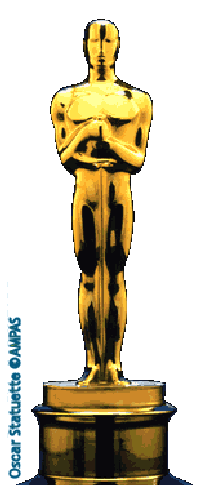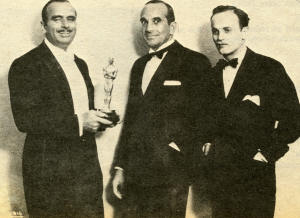 |The Man|Jolson's Legacy|Memorials to Jolson|AMPAS Oscar
|The Man|Jolson's Legacy|Memorials to Jolson|AMPAS Oscar
Of all the awards, honors, and accolades accumulated by Al Jolson, billed unchallenged as the World's Greatest Entertainer in his lifetime and since, one meaningful tribute eluded him. This page represents an attempt to examine that history.
 Although the risk is made light of in the movie The Jolson Story, the making of The Jazz Singer, the first successful talking picture, was not a sure thing. Warner Brothers Studios were in deep financial trouble when they contemplated producing this property, which they had acquired after George Jessel starred in a Broadway production.
Although in retrospect it proved to be quite a good move, Jolson's acceptance of stock in lieu of salary in the making of the movie allowed Warner Brothers to proceed with production of The Jazz Singer in the precarious financial position the studio inhabited.
Although the risk is made light of in the movie The Jolson Story, the making of The Jazz Singer, the first successful talking picture, was not a sure thing. Warner Brothers Studios were in deep financial trouble when they contemplated producing this property, which they had acquired after George Jessel starred in a Broadway production.
Although in retrospect it proved to be quite a good move, Jolson's acceptance of stock in lieu of salary in the making of the movie allowed Warner Brothers to proceed with production of The Jazz Singer in the precarious financial position the studio inhabited.
To say that the movie was a success may be a supreme understatement. At the first Academy Award ceremony, the Academy of Motion Picture Arts and Sciences felt that The Jazz Singer was not fair competition for silent films, and awarded the first Best Picture award to Wings.

|
| Douglas Fairbanks, Sr., Al Jolson, and Darryl Zanuck at the first Academy Awards Ceremony, May 16, 1929, with the special Oscar awarded for The Jazz Singer |
At that very first Academy Awards ceremony on May 16, 1929, Douglas Fairbanks presented a special Oscar to Warner Brothers production head Darryl F. Zanuck, who accepted on behalf of his studio for "producing The Jazz Singer, the pioneer outstanding talking picture, which has revolutionized the industry." Zanuck dedicated the award to Sam Warner, the brother who had served as the studio's chief executive and who had died the day before The Jazz Singer opened. Zanuck described the late executive as "the man responsible for the successful usage of the medium." The ceremonies ended on a lighter note as Al Jolson, the movie's star, entertained with patter and song. "I noticed they gave The Jazz Singer a statuette," he said. "But they didn't give me one; For the life of me, I can't see what Jack Warner can do with one of them. It can't say yes."
If The Jazz Singer was a box office hit, and it was, Al Jolson's next film, The Singing Fool, was a monster. Grossing some $10,000,000 in box office revenue, a record that stood until Gone With The Wind, eleven years later. The Singing Fool also spawned a hit song, Sonny Boy, that sold millions, making records of its own. And this film was ignored by the Academy entirely.
Al Jolson's life inspired a film biography following his new popularity after his being the first to entertain troops in World War II. Twenty years after The Jazz Singer, The Jolson Story told a fictionalized story of his life, and garnered two Academy Award wins with six nominations. It was Photoplay Magazine's Gold Medal Picture of the Year, and a top grossing film in the 1946-1947 season. In 1949, Jolson Sings Again premiered, becoming the highest grossing film of 1949. It received three Academy Award nominations, and has the distinction of being the first, and only, film to be the second biographical film of an individual who was still alive. It also has the unique status of being the first time an actor, Larry Parks, interacted with himself playing another actor, Al Jolson.
It is rare that any of these films are aired today. The Jazz Singer shows up on TCM, often in the middle of the night, but none of Jolson's other films are being broadcast. Efforts some years ago to have the Academy honor Jolson posthumously were unsuccessful. You can still help, however, to have these films shown. See the information on the Jolson Dilemma page for details of what you can do in his behalf. It has worked in many instances, and further success is within our reach.
This listing and material Copyright © 1995-2023 Marc I. Leavey, M.D. Baltimore, Maryland
 Although the risk is made light of in the movie The Jolson Story, the making of The Jazz Singer, the first successful talking picture, was not a sure thing. Warner Brothers Studios were in deep financial trouble when they contemplated producing this property, which they had acquired after George Jessel starred in a Broadway production.
Although in retrospect it proved to be quite a good move, Jolson's acceptance of stock in lieu of salary in the making of the movie allowed Warner Brothers to proceed with production of The Jazz Singer in the precarious financial position the studio inhabited.
Although the risk is made light of in the movie The Jolson Story, the making of The Jazz Singer, the first successful talking picture, was not a sure thing. Warner Brothers Studios were in deep financial trouble when they contemplated producing this property, which they had acquired after George Jessel starred in a Broadway production.
Although in retrospect it proved to be quite a good move, Jolson's acceptance of stock in lieu of salary in the making of the movie allowed Warner Brothers to proceed with production of The Jazz Singer in the precarious financial position the studio inhabited.
